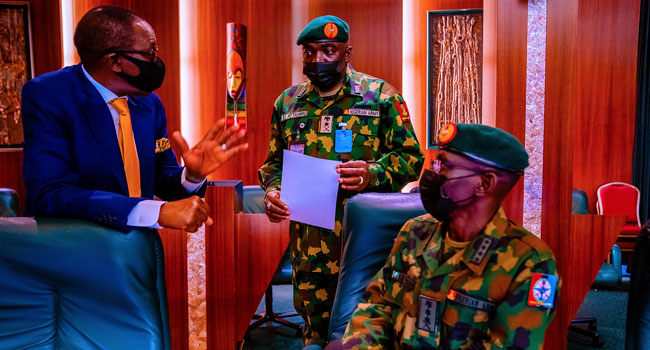News
DSS boss, Yusuf Bichi says lack of cooperation with security agencies continue to have dire consequences on national security

The Director-General, State Services, Mr Yusuf Bichi, says the success of the ongoing operations to address insecurity across the country will require mutual cooperation and robust synergy from all stakeholders.
Bichi made the call at the closing of a 3-Day Defence Headquarters Inter-Agency Cooperation Workshop with the theme: “Strengthening Inter-Agency Cooperation for Sustainable National Security”, on Thursday in Abuja.
The DSS boss, who was represented by the Director of Operation, Mr Joseph Dashwep, said that concerted efforts among security actors and stakeholders was a key mechanism needed in tackling insecurity.
According to him, regrettably, issues on boundaries of responsibilities, mutual distrust, suspicion, unhealthy competition and lack of cooperation, have continued to deal a heavy blow on the cohesion of the nation’s security architecture.
“This will continue to have dire consequences on national security, except we become intentional and determined to deal with the problem.
“In practical terms, inter-agency cooperation is simply the working together of the various components of a sub-structure toward a common vision and resolution of problems.
“It requires therefore, that the partners involved will cooperate in the exchange of relevant information and resources in support of each other’s goals.
“I must state unambiguously that, IAC is a vital necessity of this time.
“This is because it is a bedrock on which our National Security Architecture can prevent, mitigate and contain the myriad of threats facing the nation,’’ he said.
Bichi said that positive and productive outcomes could only be guaranteed if the various agencies worked together, adding that the complexity and transnational nature of crimes had made inter-agency cooperation necessary.
He recommended among other things, that there must be positive perception of the complementary agencies, cooperation and mutual trust, consistency as well as feedback system and constructive criticism.
Bichi also recommended inclusion of inter-agency cooperation in the basic curriculum at all levels of training by security agencies and reorientation amongst security personnel on its importance.
He expressed confidence that, the workshop had proffered a number of resolutions that could develop institutional frameworks for inter-agency cooperation.
According to him, the workshop must have also propelled evolving collaborations among security agencies toward combating the nation’s contemporary security challenges.
The Chief of Defence Staff (CDS), Gen. Lucky Irabor, said the prevailing security challenges confronting the nation required all of government and all of society approach to address it.
Irabor, who was represented by the Chief of Defence Policy and Plans, AVM Ayo Jolasimi, urged the participants to encourage their organisations to start implementing the recommendations from the workshop.
He pledged that the various recommendations would be followed through to ensure its implementation within the armed forces and urged all security agencies to show stronger commitment toward promoting interagency cooperation.
In a Communique issued at the end of the workshop, the participants recommended that government should ensure local government areas were allowed to function effectively through financial autonomy.
This, according to the communique, will help to create local economy and reduce insecurity in the country.
The participants recommended that the Office of the National Security Adviser (ONSA), should improve coordination of the established National Fusion Centre for effective command and control.
They also want ONSA to develop modalities to integrate civilian component into joint and combined operations.
“ONSA should convene a special committee to produce joint training doctrine for security agencies.
“ONSA should ensure that the various security and law enforcement agencies train and re-train their personnel on key competencies and capacities.
“ONSA should set up a committee to review the NSS to dearly define roles and eliminate conflict, suspicion and mistrust amongst security agencies.
“The DHQ should promote a culture of good civil-military relations, intelligence and information sharing between security agencies and civilians through seminars in national and geo-political zones of Nigeria.
“The ONSA should organise regular capacity building workshops for members of the security agencies to strengthen knowledge and the practice of effective interagency cooperation and create national facility for joint training of security agencies.”






